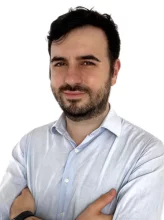Sylvain Bodard, MD, MSc

Sylvain Bodard, MD, MSc, stands out as one of the leading radiologists of his generation in France, redefining imaging's potential through groundbreaking innovation. A pioneer in ultrasound technology, he developed Sensing Ultrasound Localization Microscopy (sULM), a patented super-resolution technique (ULM SENSOR) with numerous publications in journals like eBioMedicine, Kidney International, Investigative Radiology, and Theranostics. His work enables visualization of complex structures at the unit-function level. This technique, the first globally to allow non-invasive, in vivo observation of renal graft glomeruli in patients, opens doors to early subclinical diagnosis, non-invasive monitoring, and timely interventions. Recognized for his research excellence, he has received multiple awards, including the Philippe Foundation Grant, Institut Servier Grant, and the French Radiology Society Research Grant. In defense of the principles of open science and accessibility for all, he and his team have made the codes and instructions for this technique freely available, enabling a wider audience to adopt, use, and drive progress across numerous medical disciplines.
Currently, Dr. Bodard is advancing transplantation science at the Center for Transplantation Sciences, Massachusetts General Hospital, Harvard Medical School, where he uses sULM to identify biomarkers for early graft dysfunction, holding transformative potential to improve transplant outcomes.
His research extends beyond this breakthrough. Specialized in oncologic interventional radiology, he has conducted significant work at Memorial Sloan Kettering Cancer Center in New York, focusing on robotic devices in interventional radiology. His contributions here have led to major publications on technologies that reduce radiation exposure, enhance precision, and minimize complications for both patients and clinicians.
Dr. Bodard also contributes as a co-investigator on 20-plus research protocols at Necker University Hospital in Paris. His commitment to innovation extends to medical education, where he has created a simulation tool that allows medical students to practice consultations with avatars, preparing them for real-world interactions. As an advisor to several health-tech startups, he guides the practical application of pioneering ideas into healthcare solutions.
Beyond his technical achievements, Dr. Bodard’s human qualities set him apart. He is deeply compassionate and empathetic, values that resonate with patients and colleagues alike. Known for his inclusivity and mentorship, he cultivates collaborative spaces where young professionals feel empowered. He exemplifies a future where radiology integrates technical excellence with human-centered care.
